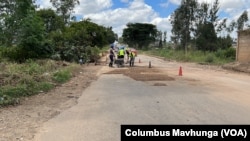HARARE, ZIMBABWE —
Zimbabwe has launched an emergency road repair program after a public outcry over the high death toll on the country’s roads.
The nation’s roads are in bad shape after years of neglect by the government of the late president, Robert Mugabe.
Instead of driving on the left, motorists drive on what is left of the road in some cases.
That’s how 46-year-old Misheck Rujada was hit by a motorist trying to avoid potholes.
Rujada welcomes the effort to bring the roads up to par.
“I think road repairs will drastically reduce road accidents,” Rujada said “As well as not speeding, and looking out for pedestrians because they are also human beings, only that they are poor. I think that is what is important."
Zimbabwe’s government says it is aware of the complaints and recently introduced what it calls Emergency Road Rehabilitation Programme 2 — better known here as ERRP2 — to ensure all roads are repaired. Officials say results should be visible by the end of the year.
Information Minister Monica Mutsvangwa said the program includes the upgrade of drainage systems to keep water off the roads.
“The Cabinet wishes to inform the public significant progress was achieved in implementing the ERRP2 on the repair and construction of drainage structures as well as the reclamation of gullies and the repair of wash-aways, where the percentage completion of works exceeded 70%,” she said.
Mutsvangwa added that the government has released about $20 million for the program, and more money will be allocated.
On average, five people die every day because of accidents on Zimbabwe’s roads, according to official statistics.
Jean Todt, the U.N. secretary-general’s Special Envoy for Road Safety, recently met with Zimbabwe officials to discuss improving the safety record.
“The U.N. secretary-general’s special envoy for road safety alluded that Zimbabwe has the opportunity to achieve the goal of reducing by half road traffic crash fatalities and injuries by 2030,” said Sirak Gebrehiwot the U.N. communications specialist in Zimbabwe. “With increased political and financial commitments from all stakeholders, the country can turn this situation around.”




